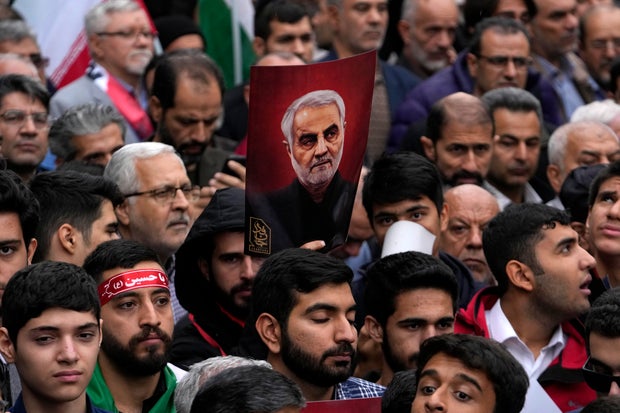An Iranian-American journalist who once worked for a U.S. government-funded broadcaster is believed to have been detained by Iran for months now, authorities said Sunday, further raising the stakes as Tehran threatens to retaliate over an Israeli attack on the country.
The imprisonment of Reza Valizadeh, acknowledged to CBS News and the Associated Press by the U.S. State Department, came as Iran marked the 45th anniversary of the American Embassy takeover and hostage crisis on Sunday. It also followed Iran’s Supreme Leader Ayatollah Ali Khamenei threatening both Israel and the U.S. the day before with “a crushing response” as long-range B-52 bombers reached the Middle East in an attempt to deter Tehran.
Valizadeh had worked for Radio Farda, an outlet under Radio Free Europe/Radio Liberty that’s overseen by the U.S. Agency for Global Media. In February, he wrote on the social platform X that his family members had been detained in an effort to see him return to Iran.
The State Department told CBS News on Sunday that they are “aware of reports that his U.S.-Iranian citizen has been arrested in Iran,” when asked about Valizadeh.
“We are working with our Swiss partners who serve as the protecting power for the United States in Iran to gather more information about this case,” a spokesperson said. “Iran routinely imprisons U.S. citizens and other countries’ citizens unjustly for political purposes. This practice is cruel and contrary to international law.”
The spokesperson said the State Department is “unable to provide additional comment due to privacy considerations.”
In August, Valizadeh apparently posted two messages suggesting he had returned to Iran despite Radio Farda being viewed by Iran’s theocracy as a hostile outlet.
“I arrived in Tehran on March 6, 2024. Before that, I had unfinished negotiations with the (Revolutionary Guard’s) intelligence department,” the message read in part. “Eventually I came back to my country after 13 years without any security guarantee, even a verbal one.”
Vahid Salemi / AP
Valizadeh added the name of a man who he claimed belonged to Iran’s Intelligence Ministry. The AP could not verify if the person worked for the ministry.
Rumors have been circulating for weeks that Valizadeh had been detained. The Human Rights Activists News Agency, which monitors cases in Iran, said that he had been detained on arrival to the country earlier this year, but later released.
He was then rearrested and sent to Evin prison, where he now faces a case in Iran’s Revolutionary Court, which routinely holds closed-door hearings in which defendants face secret evidence, the agency reported. Valizadeh had faced arrest in 2007 as well, it said.
Iran has not acknowledged detaining Valizadeh. Iran’s mission to the United Nations did not immediately respond to a request for comment.
The Voice of America, another U.S. government-funded media outlet overseen by the Agency for Global Media, first reported the State Department was acknowledging Valizadeh’s detention in Iran.
Since the 1979 U.S. Embassy crisis, which saw dozens of hostages released after 444 days in captivity, Iran has used prisoners with Western ties as bargaining chips in negotiations with the world. In September 2023, five Americans detained for years in Iran were freed in exchange for five Iranians in U.S. custody and for $6 billion in frozen Iranian assets to be released by South Korea.
Valizadeh is the first American known to be detained by Iran in the time since.
Meanwhile, Iranian state television aired footage Sunday of different cities across the country marking the anniversary of the embassy takeover.
Gen. Hossein Salami, the head of the Guard, also spoke in Tehran, where he repeated a pledge made the day before by Khamenei.
“The resistance front and Iran will equip itself with whatever necessary to confront and defeat the enemy,” he said, referring to the militant groups like Hamas and Lebanon’s Hezbollah backed by Tehran.
In Tehran, thousands at the gate of the former U.S. Embassy chanted “Death to America” and “Death to Israel.” Some burned flags of the countries and effigies of Israeli Prime Minister Benjamin Netanyahu.
They also carried images of killed top figures of Iran’s allied militant groups including Lebanese Hezbollah leader Hassan Nasrallah and Palestinian Hamas leader Yahya Sinwar. The crowd in the state-organized rallies chanted they were ready to defend the Palestinians.
Tensions are heightened in the Middle East after a war broke out on Oct. 7, 2023, when Hamas-led militants stormed into southern Israel, killing some 1,200 people, mostly civilians, and abducting another 250. Israel’s offensive has killed over 43,000 Palestinians, according to Gaza health authorities, who do not say how many were combatants but say more than half were women and children.
Hezbollah, who is also allied with Iran, began firing rockets, drones and missiles from Lebanon into Israel in solidarity with Hamas immediately after. The yearlong cross-border fighting boiled over to full-blown war on Oct. 1, when Israeli forces launched a ground invasion of southern Lebanon for the first time since 2006.
Iran, one of Israel’s bitter foes, launched its own attack, unleashing about 180 ballistic missiles at Israel on Oct. 1. Israel retaliated, targeting Iranian military facilities in airstrikes on Oct. 25.
contributed to this report.
www.cbsnews.com



